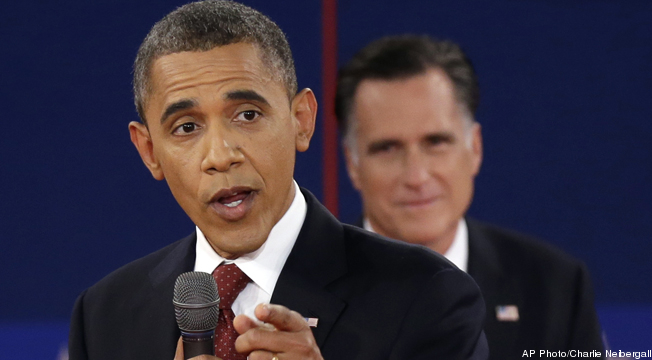Last night’s presidential debate and the remaining encounter are not the best formats for getting real answers to very tough and even intractable issues facing this and most other nations round the globe.
The reasons for this absence of substance are self-evident. If the challenges were easy, they would have already been solved. And, despite the best intentions, America’s political process and government are badly broken by a mix of partisanship, unyielding ideological differences, and the nature of a system of checks and balances that cannot work without a spirit of compromise that has been too long missing in action.
None of these overarching realities was or will be discussed in the debates. Instead, Mitt Romney declared Barack Obama and his policies as gross failures and promised that a Romney administration will do much better. The president countered with a defense of his administration that took office having to clean up the utter mess left behind by George W. Bush from a financial meltdown to unfinished and disastrous wars in Iraq and Afghanistan. As a result, these debates became political theater and not a serious way to make serious and informed judgments about the candidates.
In one sense, both candidates suffer from the same weakness—the preference for policy made on a “ready, fire, aim” basis and not more thoughtful analysis and reflection. Take, for example, Obama’s labeling of the war in Afghanistan as the “good war” and the conflict in Iraq as the “bad one.” The rationale was made in 2008 and the context of winning the presidential campaign—attacking the Republican opposition for launching a war to eliminate weapons of mass destruction that had ceased to exist while ignoring the plight of the Afghans after the Taliban had been (temporarily) driven from power.
Obama was half right about Afghanistan. But the half wrong has led to an Iraq that favors Iran over America, supports Syria, and will continue to exacerbate the Sunni-Shia split in the Muslim world. The administration rightly argues that the basis for the withdrawal was begun by the Bush administration and that demanding a longer-term presence in Iraq could have collapsed the current Maliki government. But so what? It is hard to conceive an Iraqi government less friendly to the US and West than Maliki’s, made more grating by the loss of lives and hundreds of billions if not trillion dollars wasted on this ill-founded crusade.
Then, to make matters worse, in its first few months in office, the Obama administration launched its Afghanistan-Pakistan (AfPak) study to determine a strategy for the “good war.” The strategy was profoundly flawed beginning with the name which reversed priorities. The key is and was Pakistan. Now, from that flawed relationship, we see an Afghanistan that could be close to civil war once NATO and US forces leave and a Pakistan riddled with the worst excesses of Taliban and Salafist extremism.
In the campaign, Romney has criticized Obama’s “leading from behind” in Libya; not assisting Syrian rebels and opponents of Bashar al Assad (as if we know who the “good guys” are); and for tacitly failing to provide security for Ambassador Chris Stevens, ambushed and killed in Benghazi last month. Unfortunately, these charges miss the larger failures of the Obama administration and how to correct them.
Romney could have provided powerful intellectual and strategic critiques to the Obama foreign and defense policies. He did not. Much has been made of the former governor’s extraordinary promise to label China a “currency manipulator” the first day in office (while ignoring the Federal Reserve’s quantitative easing manipulations) or calling Russia “our main geopolitical foe.” That may prove to be merely rhetoric.
Where Romney has gone hard aground is in his accusation that the Obama administration is wrecking defense by his cuts and that a Romney administration will increase military spending to 4 percent of GDP, including building fifteen warships a year and maintaining a carrier task force in the eastern Mediterranean. Currently, in constant dollars, the US spends more on defense than at the height of the Reagan buildup. More centrally,. Romney does not explain why we need more for defense nor where the funds are to be found, except possibly through borrowing from China. (And, as an aside, carrier task groups date back to the 1980s, perhaps reflecting Romney’s thinking-—the correct name is carrier strike groups!)
What does this mean? American politics are about campaigning and winning elections not about governing. A serious, fact based debate on both domestic and foreign policy issues is sorely needed. Will we get one? Possibly on a “ready, fire, aim” basis. But not one that will actually provide for the common defense or provide for the nation what it really needs.
Harlan Ullman, an Atlantic Council senior advisor, is Chairman of the Killowen Group that advises leaders of government and business.
Image: obama-hofstra-debate-close-cropped-proto-custom_28.jpg
